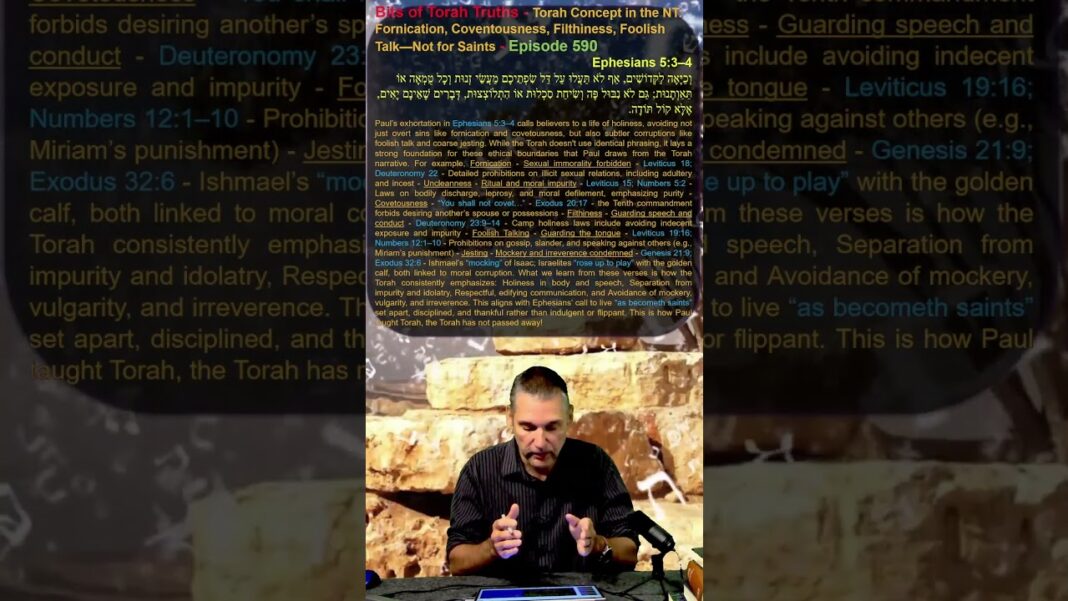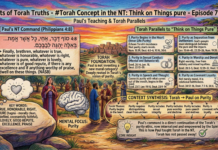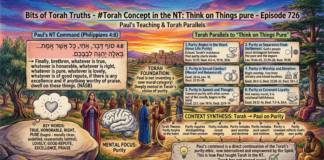Bits of Torah Truths – Torah Concept in the NT: Fornication, Covetousness, Filthiness, Foolish Talk—Not for Saints – Episode 590
Ephesians 5:3–4
וְכַיָּאֶה לַקְּדוֹשִׁים, אַף לֹא תַּעֲלוּ עַל דַּל שִׂפְתֵיכֶם מַעֲשֵׂי זְנוּת וְכָל טֻמְאָה אוֹ תַּאַוְתָנוּת; גַּם לֹא נִבּוּל פֶּה וְשִׂיחַת סִכְלוּת אוֹ הִתְלוֹצְצוּת, דְּבָרִים שֶׁאֵינָם יָאִים, אֶלָּא קוֹל תּוֹדָה.
#torah#torahwisdom#torahtruth#torahforlife#torah4you#torahtruth
Ephesians 5:3–4
5:3 But immorality or any impurity or greed must not even be named among you, as is proper among saints; 5:4 and there must be no filthiness and silly talk, or coarse jesting, which are not fitting, but rather giving of thanks. (NASB)
https://www.matsati.com/index.php/category/bits-of-torah-truths/
Paul’s exhortation in Ephesians 5:3–4 calls believers to a life of holiness, avoiding not just overt sins like fornication and covetousness, but also subtler corruptions like foolish talk and coarse jesting. While the Torah doesn’t use identical phrasing, it lays a strong foundation for these ethical boundaries that Paul draws from the Torah narrative. For example, Fornication – Sexual immorality forbidden – Leviticus 18; Deuteronomy 22 – Detailed prohibitions on illicit sexual relations, including adultery and incest – Uncleanness – Ritual and moral impurity – Leviticus 15; Numbers 5:2 – Laws on bodily discharge, leprosy, and moral defilement, emphasizing purity – Covetousness – “You shall not covet…” – Exodus 20:17 – the Tenth commandment forbids desiring another’s spouse or possessions – Filthiness – Guarding speech and conduct – Deuteronomy 23:9–14 – Camp holiness laws include avoiding indecent exposure and impurity – Foolish Talking – Guarding the tongue – Leviticus 19:16; Numbers 12:1–10 – Prohibitions on gossip, slander, and speaking against others (e.g., Miriam’s punishment) – Jesting – Mockery and irreverence condemned – Genesis 21:9; Exodus 32:6 – Ishmael’s “mocking” of Isaac; Israelites “rose up to play” with the golden calf, both linked to moral corruption. What we learn from these verses is how the Torah consistently emphasizes: Holiness in body and speech, Separation from impurity and idolatry, Respectful, edifying communication, and Avoidance of mockery, vulgarity, and irreverence. This aligns with Ephesians’ call to live “as becometh saints” set apart, disciplined, and thankful rather than indulgent or flippant. This is how Paul taught Torah, the Torah has not passed away!









